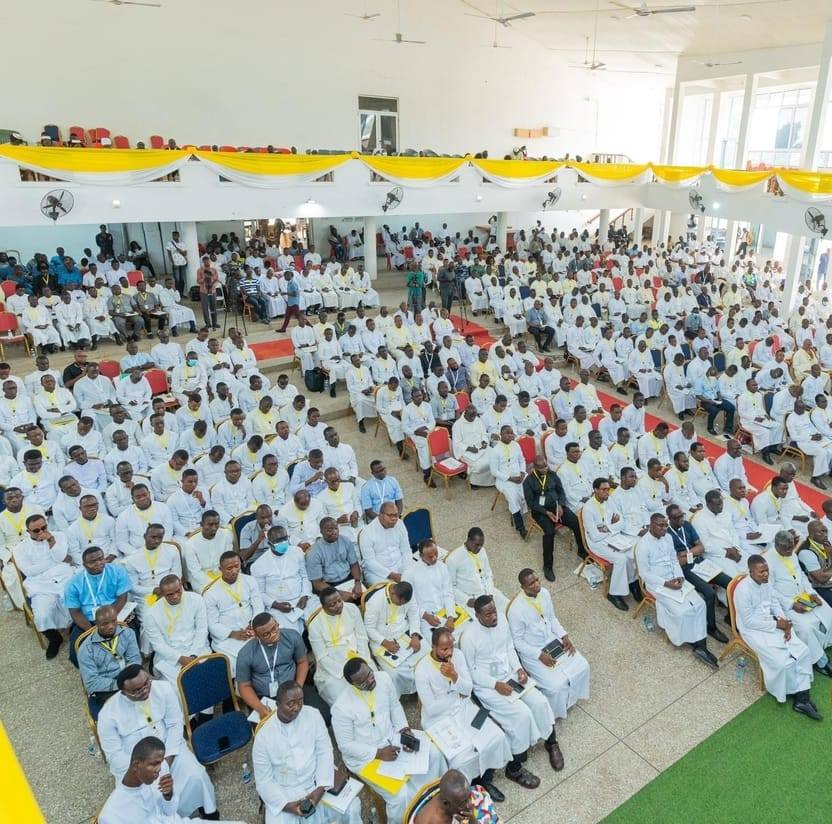The Catholic Church in Ghana is known to have a vision of providing education based on Gospel Values and a mission to contribute to the efforts of the government in the provision of formal education and the development of physical, social, intellectual, mental, moral and spiritual dimensions of the individual to become God fearing and imbued with the Gospel’s spirit of humility, service and love for one’s neighbour and country.
The Church also aims at nurturing and assisting young people to realise their vocation to serve God and humankind. The goal of Catholic Education in Ghana is to create opportunities for young people to achieve their potential through comprehensive religious, culturally-oriented and learned-centred education.
The positive role that the Catholic Church has played in the development of education in Ghana and education delivery is generally acknowledged by all Ghanaians.
As a matter of fact, Catholic Schools all over the world are widely recognised and highly sought for their unique and excellent ways of moulding the human resource entrusted into their care to become agents of solutions to the numerous challenges confronting today’s world.
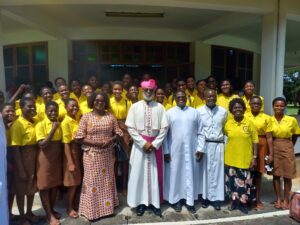
In 2023, the Catholic Education Week Celebration centred on the theme: “Catholic Education: The Indispensable Role of the Local Managers in Catholic Schools” which was carefully chosen to address a current phenomenon where most of the Local Managers are silent and/or physically absent in Schools.
In her message to mark the Education Week last year (2023), the General Manager of Catholic Schools in Ghana, Madam Araba Ahima Bentum, is quoted to have said: “It comes as no surprise to me therefore to hear all manner of people profusely thanking the Catholic Schools that moulded them to become who they are in society today.”
According to her, “It can safely be concluded that the role(s) played by the Chaplains and Local Managers are key to this success. All these notwithstanding, many continue to remark, “I attended a Catholic School and thus; I am grateful to Rev. Fr., Rev. Brother, Rev. Sister, that teacher, or Manager for his or her role in my life in the Catholic School I attended.”’
In this era when the presence of the Catholic Church, in terms of her philosophy of Education is eroding in Catholic Schools, especially at the Basic Level, it has become imperative to revisit the role of stakeholders especially Local Managers have to play in bringing back the enviable status of Catholic Schools when it comes to discipline.
In the good old days, Local Managers played influential roles in the day to day running of Catholic Schools but the questions are, are they still playing such roles? Are there any obstacles hindering them?
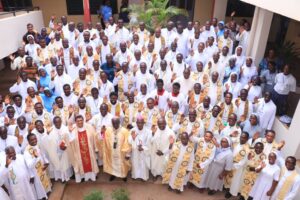
Local Managers, namely Parish Priests who have Catholic Schools under their Jurisdiction, play pivotal role in ensuring that the mission, vision and goal of Catholic education are achieved. The Schools they superintend as Local Managers are part of the Church’s property and so they need to invariably show keen interests in whatever goes on in the Schools.
While looking at the roles of the Local Managers, they need to be thanked for their immense contributions in diverse ways in making sure pupils and students produced by Catholic Schools continue to be the crème de la crème in Ghana.
Rev. Fr. John Amankwah, President of the Conference of Managers of Catholic Education Unit (COMCEU) and the Parish Priest of All Saints Parish, Santasi Fankyenebra as part of the 2023 Catholic Education Week enumerated the roles of Local Managers as follows:
- Local Managers are part of the School’s Management Committee (SMC) to ensure that decisions taken at SMC meetings are in consonance with the principles governing Catholic Education, Parish Priests or their Curates should be part of the highest decision making body at the Basic School level, that is, the SMC.
- Recommending teachers for headship in consultation with the Parish Education Committee. Since the Local Manager is at the grass root, it is expected that all things being equal, he should know the character and competence of those to be appointed as Head teachers, people who will uphold the tenets of Catholic Education.
- Recommending to the Regional Manager reposting of non-performing teachers as well as teachers of questionable characters.
- Cooperating with officials from the District/Municipal Directorate of Education.
- Paying regular visits to Catholic Schools under their jurisdiction. There should be a good rapport between the staff of the Schools and the Local Manager. It is highly required that Priests put on their cassocks or religious attire when they visit their Schools.
- Conduct regular religious activities for Pupils, students and teachers. Regular Masses are highly recommended.
- Forming the Parish Education Committee (PEC), Local Manager being the Chairman as spelt out in Ghana Catholic Education Policy. (Cf functions of the PEC page 24-25 of Ghana Catholic Education Policy 2009).
- Helping to instill Catholic identity in our schools.
- Supporting the annual Catholic Education Week Celebration which takes place between 28th January and 28th It is usually launched at Mass on Sunday close to 28th January.
- Supporting infrastructural and logistical development (include School development in your Church budget). Although, it is the duty of the District/Municipal Assemblies to provide infrastructure, the Parishes can also support this venture in their own small ways when resources are available.
- Protection of School land. In consultation with the PEC and the Diocesan Development Office, necessary documentation of School lands should be secured to avert encroachment of School lands.
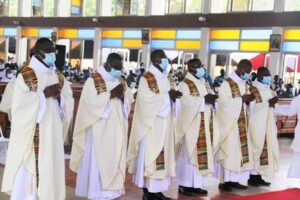
In order to enhance effective Catholic formation in Schools, I unreservedly suggest that Local Managers and Chaplains should ensure that common Catholic prayers are part of the life of the School community; frequent celebration of Masses at least once every week on a chosen day, hanging crucifix in convenient places in the School and all classrooms, observation of Catholic holydays of obligation, naming classrooms Schools with the name of Saints, having statues of Saints named after the Schools, conspicuous signposts, and the teaching of Catechism for Catholic Pupils and students.
Local Managers should therefore ensure as part of their roles to focus on building an effective Catholic identity and discipline as well as ensure the headteachers and teachers cooperate in achieving this.
I add my voice to that of Fr. Amankwah that Local Managers should ensure their Parishes and Churches support their Schools in celebrating Catholic Education Week. The 2009 Ghana Catholic Education Policy also states the need for the celebration of the Week around the feast of St. Thomas Aquinas, the Patron Saint for Catholic Schools and students.
The celebration was launched last Sunday, January 28, and currently ongoing to be climaxed on Sunday, February 4 with a Thanksgiving Mass, should not be left to the School head teachers alone to organise or left to the Parent-Teachers Associations to fully fund but Parishes should endeavour to support in diverse ways.
I am of the view that Local Managers and Chaplains should stop focusing more on bricks and mortar and non-essentials but on the spiritual growth of our Schools and instilling moral character in both the teachers and pupils. Their cordial relationship with the School Management Committees (SMC) at the Basic level and School Boards at the Secondary level and the Parent-Teacher-Associations (PTA), Head teachers and the teachers is very eminent.
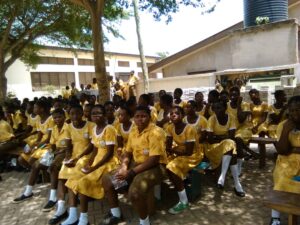
This, in my opinion, would create a conducive atmosphere for teaching and learning as well as provide conditions for imparting solid Catholic formation for pupils and students at the pre-tertiary level. It would also make other stakeholders see the Local Manager as a Spiritual Leader and Counsellor than a “pugnacious” Local Manager.
There is the urgent need for Catholic Churches with Schools to own their School- public or private. Interestingly, from the grapevine, some Parishes have neglected their own Schools due to some reasons which needs to be reversed.
The School whether public or private belongs to the Church bearing in mind that the Catholic Church is a major partner in education in Ghana, hence should be able to continue to collaborate with all stakeholders in the education enterprise.
It is my utmost hope and expectation that every Local Manager would be inspired by what the book “Our Vision for Catholic Education” written by the Archdiocese of Southwark said, “Partnership with Parish Communities and Deaneries is vital for the identity and belonging of the School. The school will be able to offer expertise in communicating the faith to the children and young people. Local Managers will provide sacramental and pastoral ministry to schools and promote Catholic schools as the first choice for parents”.
By Damian Avevor

